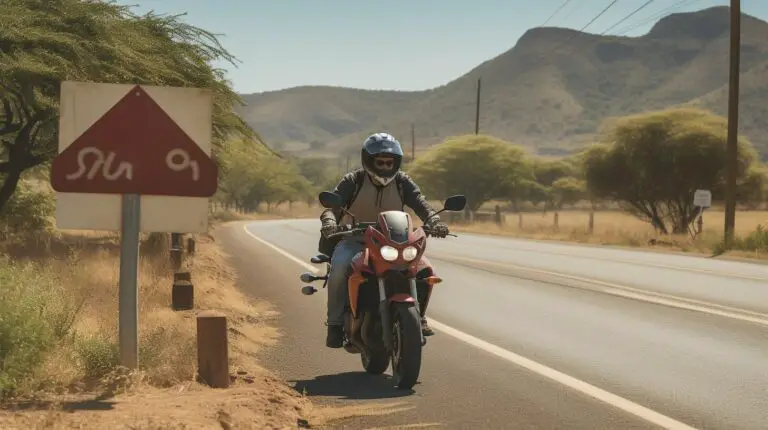Understanding the motorcycle helmet laws in South Africa is crucial for riders and passengers to ensure their safety and compliance with the law. In South Africa, it is required by law for motorcycle riders and passengers to wear protective helmets while driving on public roads. The law states that no person can drive or be a passenger on a motorcycle, motor tricycle, or motor quadrucycle without wearing a helmet. This law is in place to prevent head and facial injuries in the event of a crash. Helmet usage has been found to significantly reduce the risk of fatal and serious injuries.
Key Takeaways:
- Motorcycle riders and passengers in South Africa are required by law to wear helmets while driving on public roads.
- Helmets help prevent head and facial injuries in the event of a crash.
- Wearing helmets significantly reduces the risk of fatal and serious injuries.
- The law applies to all motorcycles, motor tricycles, and motor quadrucycles.
- Compliance with the helmet law is crucial for ensuring rider safety and avoiding legal consequences.
The Importance of Motorcycle Helmet Laws
Motorcycle helmet laws in South Africa play a crucial role in promoting the safety of riders and passengers by minimizing the risk of head and facial injuries in the event of an accident. Wearing a helmet is not only a legal requirement but also a smart choice for protecting oneself on the road. Head injuries are a common occurrence in motorcycle accidents, and they can have severe and long-lasting consequences. By mandating the use of helmets, the government aims to reduce the likelihood and severity of such injuries.
Studies have consistently shown that wearing a helmet significantly reduces the risk of fatal and serious injuries in motorcycle accidents. The helmet acts as a protective barrier, absorbing the impact of a collision and distributing the force more evenly across the head. This helps to prevent traumatic brain injuries and skull fractures, which can be life-threatening or lead to lifelong disabilities. Helmet laws also extend to facial protection, safeguarding riders from facial fractures, lacerations, and other injuries.
It is essential to choose the right helmet that meets the specified safety standards outlined in South Africa’s helmet regulations. A certified helmet is designed to provide adequate protection and fit securely on the rider’s head. It is crucial to ensure that the helmet is the correct size and worn properly to maximize its effectiveness. Regular inspection and maintenance, such as replacing damaged or expired helmets, are also crucial for optimal safety.
| The Benefits of Motorcycle Helmet Laws: |
|---|
| 1. Reduces the risk of head and facial injuries |
| 2. Minimizes the severity of injuries in accidents |
| 3. Protects against traumatic brain injuries and skull fractures |
| 4. Prevents facial fractures, lacerations, and other injuries |
| 5. Promotes overall rider safety and compliance |
Motorcycle helmet laws in South Africa are a crucial component of ensuring the safety of riders and passengers on the road. By mandating the use of helmets, the government aims to reduce the risk of head and facial injuries and promote responsible riding practices. It is essential for all motorcycle enthusiasts to understand and comply with these laws to protect themselves and others on the road.
Understanding South Africa’s Helmet Regulations
South Africa has established clear regulations regarding helmet usage for motorcycle riders and passengers, ensuring that specific safety standards are met. These regulations aim to protect individuals from head and facial injuries in the event of a crash, reducing the risk of fatal and serious injuries. It is important for all motorcyclists and their passengers to understand and adhere to these regulations to ensure their safety on the roads.
Under South Africa’s helmet regulations, it is required by law for all motorcycle riders and passengers to wear protective helmets when driving on public roads. The law applies to motorcycles, motor tricycles, and motor quadrucycles. Failure to comply with this requirement can lead to penalties and legal consequences, as well as potential impacts on insurance coverage.
To meet the helmet regulations in South Africa, helmets must meet specific safety standards. These standards include the certification of helmets by recognized authorities and the compliance with certain technical specifications. It is crucial for riders to choose helmets that have been approved and certified, as this ensures that the helmet provides adequate protection and meets the necessary safety requirements.
| Helmet Type | Requirements |
|---|---|
| Full-face helmets | Must cover the entire head, including the face, and have a secure chin strap |
| Open-face helmets | Must cover the top, back, and sides of the head, leaving the face exposed, and have a secure chin strap |
| Modular or flip-up helmets | Must provide full coverage when the chin bar is down and have a secure chin strap |
| Off-road helmets | Must cover the top, back, and sides of the head, with a secure chin strap, and have appropriate visors and goggles for eye protection |
It is important for riders to familiarize themselves with the specific requirements for the type of helmet they choose to ensure compliance with South Africa’s regulations. Regular helmet maintenance and replacement are also crucial to ensure the ongoing effectiveness and safety of the helmet.
Who Must Wear Helmets in South Africa?
In South Africa, helmet laws apply to both motorcycle riders and passengers, with specific age restrictions and exceptions to be aware of. According to the regulations, all motorcycle riders and their passengers are required to wear approved helmets while driving on public roads. This applies to motorcycles, motor tricycles, and motor quadrucycles.
For individuals under the age of 12, helmet usage is mandatory, regardless of whether they are riding as a passenger or operating the motorcycle themselves. However, there are exceptions to the rule. In certain cases, riders and passengers who are participating in authorized parades, processions, or similar events may be exempt from wearing helmets.
It is important to note that the helmet regulations in South Africa are strictly enforced. Failure to comply with these laws can result in penalties, fines, and legal consequences. In addition, insurance coverage may be impacted if a rider or passenger is involved in an accident and was not wearing a helmet as required by law. Therefore, it is crucial for all motorcycle riders and passengers to familiarize themselves with and adhere to the helmet regulations in South Africa.
Approved Helmet Types in South Africa
When it comes to helmet selection in South Africa, it is crucial to choose a helmet that meets the approved safety standards and carries the necessary certification. The country has specific regulations in place to ensure that helmets provide adequate protection for motorcycle riders and passengers.
The South African Bureau of Standards (SABS) has set safety standards that helmets must meet to be considered legal for use on the road. These standards include requirements for impact resistance, penetration resistance, strap effectiveness, and field of vision. It is important to look for helmets that have the SABS certification mark to ensure they meet these standards.
South Africa recognizes a variety of helmet types that meet the approved safety standards. Full-face helmets provide the most comprehensive protection, covering the entire head and face. Open-face helmets, also known as three-quarter helmets, cover the head but leave the face exposed. Half helmets, which cover only the top of the head, are also allowed but provide the least amount of protection.
Approved Helmet Types in South Africa:
| Type | Description |
|---|---|
| Full-face helmet | Covers the entire head and face, providing maximum protection |
| Open-face helmet | Covers the head, leaving the face exposed |
| Half helmet | Covers only the top of the head, providing the least protection |
It is important to note that regardless of the type of helmet chosen, it should fit properly and securely on the rider’s head. A helmet that is too loose or too tight may not provide adequate protection in the event of a crash. Regular maintenance and inspection of the helmet are also essential to ensure its ongoing effectiveness.
Penalties for Non-Compliance
Riding without a helmet in South Africa can result in severe penalties, including fines, legal consequences, and potential complications with insurance coverage. It is essential for all motorcycle riders and passengers to adhere to the helmet regulations to ensure their safety and compliance with the law.
The penalties for not wearing a helmet vary depending on the specific circumstances and the discretion of law enforcement officers. As of [insert year], the fine for riding without a helmet in South Africa can range from [insert minimum fine] to [insert maximum fine]. Repeat offenders may face higher fines and more severe consequences.
| Possible Penalties for Non-Compliance: |
|---|
| Fine: Ranged from [insert minimum fine] to [insert maximum fine] |
| Legal consequences: [insert potential legal consequences] |
| Complications with insurance coverage: [insert potential complications] |
It is important to note that wearing a helmet not only helps protect against injuries but also ensures compliance with the law. Choosing a certified helmet that meets the South Africa helmet regulations is crucial for maximum safety and legal compliance. By wearing a helmet, motorcyclists can reduce the risk of head and facial injuries, potentially save lives, and avoid the penalties associated with non-compliance.
Helmet Safety Tips and Best Practices
Ensuring your helmet provides optimal protection requires proper fitment, regular maintenance, and adherence to recommended replacement guidelines. Follow these helmet safety tips and best practices to maximize your safety while riding in South Africa:
- Choose the right size: When purchasing a helmet, it’s essential to select the correct size for a snug and secure fit. Use a measuring tape to measure the circumference of your head, just above your eyebrows. Refer to the helmet manufacturer’s sizing chart to determine the appropriate size.
- Inspect regularly: Regularly inspect your helmet for any signs of damage, such as cracks, dents, or loose padding. Check the chinstrap for wear and tear, ensuring it is securely fastened. If you notice any significant damage or wear, replace your helmet immediately.
- Keep it clean: Clean your helmet regularly to maintain its integrity. Use a mild soap and warm water to gently clean the exterior shell and a soft cloth to wipe off any dirt or debris. Avoid using harsh chemicals or solvents, as they can damage the helmet’s material.
Proper Helmet Storage:
When not in use, store your helmet in a cool, dry place away from direct sunlight and extreme temperatures. Avoid hanging it from the mirrors or handlebars of your motorcycle, as this can cause unnecessary stress on the straps and shell. Instead, use a helmet bag or a designated helmet storage area to protect it from accidental damage.
By following these helmet safety tips and best practices, you can ensure that your helmet provides optimal protection and helps reduce the risk of head and facial injuries while riding in South Africa.
| Helmet Safety Tips and Best Practices |
|---|
| Choose the right size |
| Inspect regularly |
| Keep it clean |
Enforcement and Awareness Campaigns
The enforcement of motorcycle helmet laws in South Africa is a collaborative effort involving law enforcement agencies and awareness campaigns focused on promoting rider safety. The aim is to ensure that all motorcyclists and passengers adhere to the legal requirement of wearing helmets while riding on public roads. Law enforcement agencies play a crucial role in enforcing these laws and conducting regular checks to ensure compliance. They have the authority to issue fines and penalties to individuals found not wearing helmets.
Alongside enforcement, various awareness campaigns are conducted to educate the public about the importance of helmet usage and the potential consequences of non-compliance. These campaigns aim to reach both motorcyclists and the general public, emphasizing the role of helmets in preventing head and facial injuries in the event of an accident. Through education and advocacy, these campaigns strive to create a culture of helmet-wearing among motorcyclists and promote safer riding practices.
One effective method used in awareness campaigns is the dissemination of informational materials such as brochures and leaflets that highlight the benefits of wearing helmets. These materials often include statistics and research findings that demonstrate the effectiveness of helmets in reducing the severity of injuries. Additionally, public service announcements and social media campaigns are employed to reach a wider audience and increase awareness about motorcycle helmet laws and safety practices.
| Enforcement Actions | Fines | Points on License |
|---|---|---|
| Not wearing a helmet | $100 | 2 |
| Using a non-compliant helmet | $150 | 3 |
| Carrying a passenger without a helmet | $200 | 4 |
By combining enforcement efforts with comprehensive awareness campaigns, South Africa aims to improve motorcycle safety and reduce the number of head and facial injuries resulting from accidents. These initiatives work together to create a safer environment for motorcyclists, raising awareness about the importance of helmet usage and encouraging compliance with the law.
International Comparison of Helmet Laws
Understanding how South Africa’s motorcycle helmet laws compare to those in other countries can provide valuable insights into global best practices for rider safety. Here is a comparison of helmet requirements for motorcyclists in South Africa and a few other countries:
| Country | Helmet Requirement |
|---|---|
| United States | In the United States, helmet laws vary from state to state. Some states have universal helmet laws that require all motorcyclists, regardless of age, to wear helmets. Other states have partial helmet laws, which only require certain individuals, such as those under a certain age or those with a learner’s permit, to wear helmets. |
| United Kingdom | In the United Kingdom, all motorcyclists and their passengers are required to wear helmets that meet British safety standards. Failure to comply with this law can result in fines and penalty points on the rider’s driving license. |
| Australia | Helmet laws in Australia vary by state and territory. In general, all motorcyclists are required to wear helmets that meet Australian safety standards. However, there are some exemptions for motorcyclists riding within certain designated areas or participating in specific events. |
It is clear that many countries, including South Africa, have implemented helmet laws to promote rider safety. These laws aim to reduce the risk of head and facial injuries in motorcycle accidents. By comparing and understanding the helmet requirements in different countries, we can identify best practices and ensure that riders are adequately protected on the road.
Remember, wearing a certified helmet is crucial for rider safety, regardless of the specific regulations in your country. Always choose a helmet that meets the safety standards outlined by the relevant authorities to ensure maximum protection while riding.
The Impact of Helmet Usage on Rider Safety
Motorcycle safety laws in South Africa require all riders and passengers to wear protective helmets while driving on public roads. This legal requirement aims to prevent head and facial injuries in the event of a crash. Numerous studies and research have consistently shown that helmet usage significantly reduces the risk of fatal and serious injuries in motorcycle accidents.
According to data from the South African Department of Transport, riders who wear helmets have a much higher chance of surviving a crash compared to those who do not. Helmets provide a crucial layer of protection by absorbing the impact of a collision, reducing the force exerted on the skull and brain. They also serve as a barrier against debris, wind, and weather conditions that can impair vision and concentration.
Furthermore, studies have found that helmets can help prevent severe facial injuries, including fractures, lacerations, and other soft tissue damage. By providing a protective shell around the head and face, helmets decrease the risk of contact with hard surfaces or objects during an accident.
| Helmet Usage Statistics | Impact on Fatalities | Impact on Serious Injuries |
|---|---|---|
| 90% of motorcycle crash fatalities occur among riders not wearing helmets | Helmets reduce the risk of death by 42% | Helmets reduce the risk of serious head injuries by 69% |
| Helmeted riders are 37% less likely to suffer fatal head injuries | Helmets decrease the likelihood of long-term disability by 33% | Helmets decrease the likelihood of facial injuries by 65% |
In conclusion, wearing a helmet while riding a motorcycle is crucial for protecting both the rider and passenger from severe injuries. South Africa’s helmet regulations align with international safety standards and are designed to reduce the risk of fatalities and serious harm in motorcycle accidents. By adhering to these helmet requirements and choosing certified helmets that meet safety standards, motorcyclists can significantly improve their chances of surviving and minimizing the impact of accidents.
Do Motorcyclists in Kenya Need to Wear Helmets According to the Law?
Motorcycle helmet regulations in kenya stipulate that all motorcyclists must wear helmets while on the road. This law is crucial for ensuring safety and preventing serious head injuries in the event of accidents. It is essential for motorcyclists in Kenya to adhere to this rule to protect themselves from potential harm and stay in compliance with the law.
Conclusion
Understanding the motorcycle helmet requirements in South Africa is essential to ensure safe and compliant riding practices, promoting the well-being of riders and passengers on the road.
In South Africa, it is required by law for motorcycle riders and passengers to wear protective helmets while driving on public roads. The law states that no person can drive or be a passenger on a motorcycle, motor tricycle, or motor quadrucycle without wearing a helmet. This law is in place to prevent head and facial injuries in the event of a crash.
Helmet usage has been found to significantly reduce the risk of fatal and serious injuries. Research and statistics have shown that wearing a helmet greatly increases the chances of survival and decreases the severity of head injuries in motorcycle accidents. The helmet acts as a protective barrier, absorbing the impact of a collision and minimizing the risk of traumatic brain injury.
Therefore, it is crucial for all motorcyclists and their passengers in South Africa to abide by the helmet requirements set forth by the law. By doing so, they not only comply with the legal regulations but also prioritize their own safety and the safety of others on the road. Wearing a helmet is a simple yet effective measure that can save lives and prevent life-altering injuries.
FAQ
Q: Are motorcycle helmets required in South Africa?
A: Yes, it is required by law for motorcycle riders and passengers to wear protective helmets while driving on public roads in South Africa.
Q: Why are motorcycle helmet laws important?
A: Motorcycle helmet laws are important because they help prevent head and facial injuries in the event of a crash. Wearing helmets significantly reduces the risk of fatal and serious injuries.
Q: What are South Africa’s helmet regulations?
A: South Africa’s helmet regulations state that no person can drive or be a passenger on a motorcycle, motor tricycle, or motor quadrucycle without wearing a helmet that meets the specified safety standards.
Q: Who must wear helmets in South Africa?
A: All motorcycle riders and passengers, regardless of age, are required to wear helmets in South Africa.
Q: What types of helmets are approved in South Africa?
A: Helmets that meet the specified safety standards are approved for use in South Africa. It is important to choose a certified helmet for optimal safety.
Q: What are the penalties for not wearing a helmet in South Africa?
A: Non-compliance with motorcycle helmet laws in South Africa can result in fines and may have legal implications. It can also impact insurance coverage in case of an accident.
Q: What are some helmet safety tips and best practices?
A: Some helmet safety tips and best practices include ensuring proper helmet fitment, regular maintenance, and replacing helmets after accidents or when they become worn out.
Q: How are motorcycle helmet laws enforced in South Africa?
A: Motorcycle helmet laws in South Africa are enforced by law enforcement agencies. There may also be awareness campaigns and initiatives to promote helmet usage and rider safety.
Q: How do South Africa’s helmet laws compare to those in other countries?
A: South Africa’s motorcycle helmet laws may have similarities and differences compared to other countries’ laws. It is important to understand and follow the specific requirements in each jurisdiction.
Q: What is the impact of helmet usage on rider safety?
A: Wearing helmets has been found to significantly reduce the risk of fatal and serious injuries in motorcycle accidents. Statistics and research support the effectiveness of helmet usage in ensuring rider safety.







